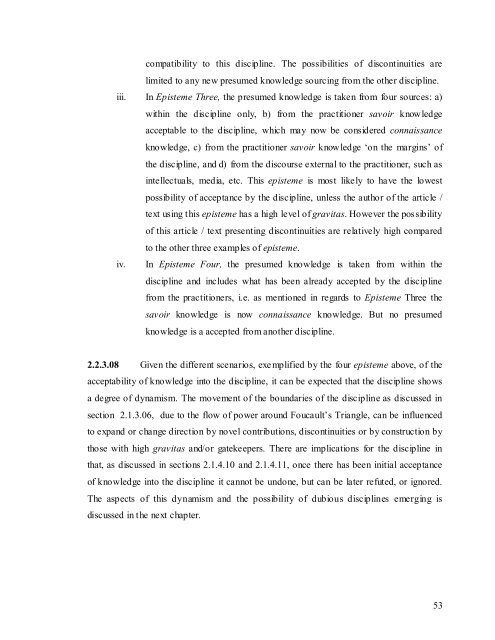Mapping the aliran of the academic discipline of entrepreneurship: A ...
Mapping the aliran of the academic discipline of entrepreneurship: A ...
Mapping the aliran of the academic discipline of entrepreneurship: A ...
Create successful ePaper yourself
Turn your PDF publications into a flip-book with our unique Google optimized e-Paper software.
compatibility to this <strong>discipline</strong>. The possibilities <strong>of</strong> discontinuities are<br />
limited to any new presumed knowledge sourcing from <strong>the</strong> o<strong>the</strong>r <strong>discipline</strong>.<br />
iii. In Episteme Three, <strong>the</strong> presumed knowledge is taken from four sources: a)<br />
within <strong>the</strong> <strong>discipline</strong> only, b) from <strong>the</strong> practitioner savoir knowledge<br />
acceptable to <strong>the</strong> <strong>discipline</strong>, which may now be considered connaissance<br />
knowledge, c) from <strong>the</strong> practitioner savoir knowledge ‘on <strong>the</strong> margins’ <strong>of</strong><br />
<strong>the</strong> <strong>discipline</strong>, and d) from <strong>the</strong> discourse external to <strong>the</strong> practitioner, such as<br />
intellectuals, media, etc. This episteme is most likely to have <strong>the</strong> lowest<br />
possibility <strong>of</strong> acceptance by <strong>the</strong> <strong>discipline</strong>, unless <strong>the</strong> author <strong>of</strong> <strong>the</strong> article /<br />
text using this episteme has a high level <strong>of</strong> gravitas. However <strong>the</strong> possibility<br />
<strong>of</strong> this article / text presenting discontinuities are relatively high compared<br />
to <strong>the</strong> o<strong>the</strong>r three examples <strong>of</strong> episteme.<br />
iv. In Episteme Four, <strong>the</strong> presumed knowledge is taken from within <strong>the</strong><br />
<strong>discipline</strong> and includes what has been already accepted by <strong>the</strong> <strong>discipline</strong><br />
from <strong>the</strong> practitioners, i.e. as mentioned in regards to Episteme Three <strong>the</strong><br />
savoir knowledge is now connaissance knowledge. But no presumed<br />
knowledge is a accepted from ano<strong>the</strong>r <strong>discipline</strong>.<br />
2.2.3.08 Given <strong>the</strong> different scenarios, exe mplified by <strong>the</strong> four episteme above, <strong>of</strong> <strong>the</strong><br />
acceptability <strong>of</strong> knowledge into <strong>the</strong> <strong>discipline</strong>, it can be expected that <strong>the</strong> <strong>discipline</strong> shows<br />
a degree <strong>of</strong> dynamism. The movement <strong>of</strong> <strong>the</strong> boundaries <strong>of</strong> <strong>the</strong> <strong>discipline</strong> as discussed in<br />
section 2.1.3.06, due to <strong>the</strong> flow <strong>of</strong> power around Foucault’s Triangle, can be influenced<br />
to expand or change direction by novel contributions, discontinuities or by construction by<br />
those with high gravitas and/or gatekeepers. There are implications for <strong>the</strong> <strong>discipline</strong> in<br />
that, as discussed in sections 2.1.4.10 and 2.1.4.11, once <strong>the</strong>re has been initial acceptance<br />
<strong>of</strong> knowledge into <strong>the</strong> <strong>discipline</strong> it cannot be undone, but can be later refuted, or ignored.<br />
The aspects <strong>of</strong> this dynamism and <strong>the</strong> possibility <strong>of</strong> dubious <strong>discipline</strong>s emerging is<br />
discussed in t he next chapter.<br />
53

















